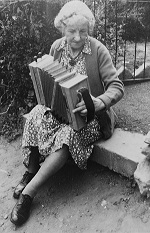Tunes from Beatrice Hill
 Russell Wortley encountered Beatrice Hill at Bromsberrow Heath, a village in Gloucestershire but with an address outside the County because of the location of the nearest Postal Sorting Office. Beatrice Hill’s father, who came originally from Gloucester, kept the Bell public house in Bromsberrow Heath and was the Morris “King”; her sister Emily Bishop was a fine singer and can be heard singing and talking about the Morris Dancing on Country Songs and Carols (Folktrax FTX-129; see also Emily Bishop on this webslte). Russell Wortley’s recordings of Beatrice Hill and Emily Bishop are available for listening, by appointment, at the British Library, 96 Euston Road, London NW1 2DB. See http://cadensa.bl.uk/cgi-bin/webcat.
Russell Wortley encountered Beatrice Hill at Bromsberrow Heath, a village in Gloucestershire but with an address outside the County because of the location of the nearest Postal Sorting Office. Beatrice Hill’s father, who came originally from Gloucester, kept the Bell public house in Bromsberrow Heath and was the Morris “King”; her sister Emily Bishop was a fine singer and can be heard singing and talking about the Morris Dancing on Country Songs and Carols (Folktrax FTX-129; see also Emily Bishop on this webslte). Russell Wortley’s recordings of Beatrice Hill and Emily Bishop are available for listening, by appointment, at the British Library, 96 Euston Road, London NW1 2DB. See http://cadensa.bl.uk/cgi-bin/webcat.
Peter Kennedy also recorded three of Beatrice Hill’s tunes when he was working for the BBC. He issued them on Folktracks 45-115, A Nutting We will Go.
Mrs Hill played for Peter Kennedy in F. The tunes recorded by Russell Wortley are in E. The difference could be due to different tape speeds. Thanks to Rob Gowing, Mrs Hill’s grandson, we have examined her melodeon, and found that it is in F.
Index to Beatrice Hill’s Tunes
| Title | Page in pdf | abc X: № |
| Beatrice Hill’s “3 hand reel”; Untitled Hornpipe | 2 | 5 |
| Down the Middle | 3 | 7 |
| Girl with the blue dress on; Untitled Polka | 3 | 6 |
| Herefordshire Breakdown | 1 | 2 |
| Jacko Robinson | 2 | 4 |
| Nelly’s Tune | 1 | 1 |
| Nutting we will Go | 1 | 3 |
| Untitled Tune | 3 | 8 |
Notes on the Tunes
Down the Middle Not only did Beatrice Hill play the tune on the melodeon, she and her sister Emily Bishop also sang it, using the following words in the B music.
“Don’t you hurt her, try to please her,
‘cos she is my pretty little dear.”
Or
“Down the middle, down the middle” .
The alternative first bar is as they sang it. Mrs Hill tried to remember the rest of the music saying: “That isn’t complete.”
Herefordshire Breakdown is a version of the B music of Fanny Frail, the tune used for the Evesham Stick Dance and Abingdon Morris Squire’s Dance, while it also resembles the Cliff Hornpipe (Thanks to Philip Heath-Coleman for pointing out the latter).
Jacko Robinson Beatrice Hill played this tune for the Bromsberrow Heath Three-handed Reel. She described how the dancers went round each other, then stopped back to back, turned and faced each other and “jigged (stepped) to one another”. “I was supposed to play quicker then.” This jigging corresponded to the 2nd strain of the tune.
Nelly’s Tune For Peter Kennedy Mrs Hill played the strains in the order AABBCAA. Lengths of d”s at the end of each strain were actually:
1st time end of B: 3 crotchets
2nd time end of B: 2 crotchets
End of C: 3 crotchets
The Three-Handed Reel, was performed at Bromsberrow Heath by three pairs of dancers, either with stick clashing or with stepping. (See Russell Wortley’s article in EDS and Lionel Bacon’s book.) Both Stephen Baldwin and Beatrice Hill played tunes for it. RW published Jacko Robinson, though without mentioning the name, which Mrs Hill had told him. With some prompting she agreed that A-Nutting we will Go was also used for the dance. Mr Baldwin’s favourite was Cock of the North, and he mentioned Flowers of Edinburgh as an alternative. (see Jacko Robinson)
Beatrice Hill’s Untitled Hornpipe was recorded twice by Russell Wortley, on 26 June 1954 and 27 August 1957. In 1954 BH played once through, AB without repeats. This is the version transcribed here. The 1957 recording is rather feint she played BAB.
Michael Raven published it under the title Beatrice Hill’s Three Handed Reel, under which it has become known. I have not found any evidence that Mrs Hill actually played it for the Reel.
References
Lionel Bacon, A Handbook of Morris Dances, The Morris Ring, 1974
Russell Wortley, ‘The Bromsberrow Heath Morris Dances’, English Dance & Song, Vol. 23, p 94, June 1959
Discography
Folktracks 45-115, A Nutting We will Go
Russell Wortley’s recordings, British Library, C777/1, recorded 27-08-1957, and C777/6, recorded 18-08-1959.